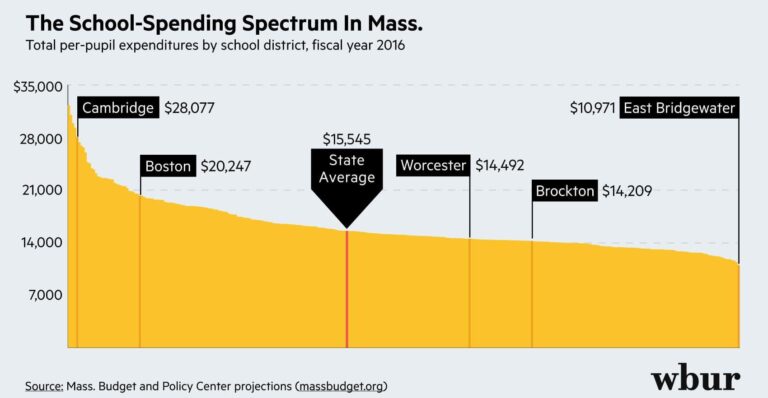Federal budget reductions are set to considerably impact Massachusetts schools,raising concerns about the future of education funding across the state. As federal support declines, districts are facing increased pressure to manage resources delicately while maintaining quality education for students. Educators, parents, and officials warn that these cuts could undermine vital programs, staff retention, and essential services, jeopardizing the progress made in recent years. Stakeholders are now calling for urgent action to address the shortfall and protect the state’s educational standards.
Table of Contents
- Federal Budget Cuts Put Massachusetts School Programs at Risk
- Impact on Student Services and Special Education Funding
- Community Response and Stakeholder Concerns Across Districts
- Policy Recommendations to Safeguard and Reallocate Education Resources
- Closing Remarks
Federal Budget Cuts Put Massachusetts School Programs at Risk
Massachusetts public schools, long recognized for their academic excellence and commitment to student safety, now face growing uncertainty as proposed federal budget cuts threaten to slash critical funding. These reductions could directly impact programs that provide essential resources for students, including special education, after-school support, and technological upgrades. State officials warn that without sustained federal investment, schools may be forced to make tough decisions, possibly resulting in larger class sizes and diminished learning opportunities.
At risk programs include:
- Title I funding for low-income students
- Special education services
- School safety and mental health initiatives
- STEM and arts enrichment programs
The potential cuts come at a time when Massachusetts prides itself on maintaining some of the best public school systems in the nation,making the impact all the more pronounced. Education leaders stress that a collaborative effort between state and federal governments is required immediately to preserve the quality and accessibility that Massachusetts schools have historically delivered.
Impact on Student Services and Special Education Funding
Massachusetts schools face a critical setback as federal budget cuts threaten to slash funding earmarked for essential student services and special education programs. These reductions jeopardize the support systems that hundreds of vulnerable students rely on daily, including speech therapy, counseling, and individualized learning plans. Districts warn that without federal aid, maintaining current staffing levels and program quality will be nearly impossible, risking meaningful disruptions in educational outcomes.
Educators and administrators highlight key concerns:
- Reduced access to tailored support for students with disabilities
- Increased strain on already limited district resources
- Potential layoffs of specialized personnel and aides
- Compromised compliance with federal mandates for special education
The cumulative effect undermines not only equity in education but also threatens to widen achievement gaps at a time when inclusive services are more critical than ever.
Community Response and Stakeholder Concerns Across Districts
Parents, educators, and local officials across Massachusetts have voiced deep concern about the federal funding cuts, emphasizing that these reductions threaten not only academic programs but also the general safety measures that have helped Massachusetts schools maintain their top national ranking. Many community members worry about the long-term impact on students’ educational equity, especially in districts already grappling with limited resources. School committees have begun organizing town hall meetings to discuss potential district-wide repercussions, while teachers’ unions forecast challenges in retaining qualified staff without stable financial support.
Key points raised by stakeholders include:
- Potential cuts to extracurricular and support services that are crucial for student advancement;
- Concerns over increased class sizes due to budget constraints;
- Fears that safety and mental health programs may be compromised, despite Massachusetts’ reputation for safe schools; and
- Calls for state-level intervention to offset the federal shortfall and protect the gains made in public education.
Policy Recommendations to Safeguard and Reallocate Education Resources
In response to the alarming federal education cuts affecting Massachusetts schools, policymakers must prioritize transparent reallocation of existing resources to minimize disruption in classrooms. This includes adopting a strategy that guarantees equitable distribution of funds, focusing on the districts most vulnerable to financial shortfalls. Additionally,strengthening partnerships between state agencies and local education authorities can enhance collaborative planning and accountability,ensuring that every dollar spent maximizes student outcomes.
Experts advocate for a comprehensive approach that also emphasizes:
- Protecting core instructional budgets to maintain teacher retention and classroom supplies.
- Investing in community and family engagement initiatives to foster shared duty and support systems around students.
- Leveraging innovative technologies effectively to supplement learning where physical resources lag.
- Prioritizing professional development for educators to utilize evolving tools for equitable education delivery.
These targeted policies can form a resilient framework to safeguard the educational landscape amidst fiscal constraints, preserving the critical mission of serving all Massachusetts students with fairness and quality.
Closing Remarks
As federal education funding faces significant reductions, Massachusetts schools brace for difficult decisions ahead. The impact of these cuts could reverberate through classrooms, affecting resources, programs, and ultimately student outcomes.Stakeholders across the state are urging federal officials to reconsider the proposed budget changes,emphasizing the essential role that consistent federal support plays in maintaining educational quality. With the future uncertain, Massachusetts educators, parents, and policymakers remain vigilant in advocating for the funding necessary to sustain and improve the state’s schools.

